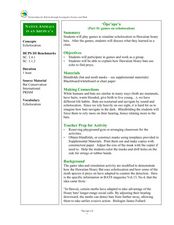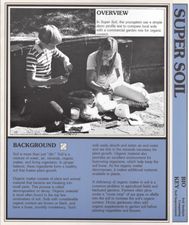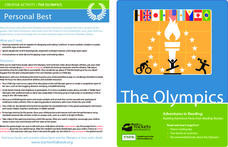Curated OER
Games on Echolocation
Get a little batty with life science! This fun simulation game replicates how bats use echolocation to hunt moths in their native Hawaiian habitat. After creating blind folds and discussing some basic principles of echolocation, students...
Curated OER
How Many Organisms Live Here?
Students observe pond organisms through a sample from a pond. In this pond organisms instructional activity, students use a pail and scoop from the bottom of the pond to take a sampling. Students analyze the organisms removed from the...
Curated OER
Super Soil
Young scholars compare the organic matter found in soil. In this soil lesson, students compare a commercial garden mix soil to their local soil and determine which has more organic material.
Curated OER
Olympic Challenge
Have your class research a country related to the Olympics. They participate in physical education activities included in the Presidential Physical Fitness Test and write about their country. This is a very interactive plan.
Curated OER
THE IDITAROD RACE STATIONS
Students are introduced to the Alaskan Iditarod Race and then they visit ten stations/checkpoints in the gym where they perform various physical activities based on the race.
Curated OER
Healthy Snacks Project Lesson
After learning why it is important to limit salt, fat, and sugar in their diets, divide your class into pairs or groups to complete this project. Each group will create two charts: unhealthy and healthy foods. They will cut out food...
Curated OER
Souper Art
Turn your young artists into great marketing specialists with this fun lesson plan! They will turn ordinary soup cans into exciting choices for dinner by recreating the can label. This is a fantastic project to connect art, advertising,...
Curated OER
Spice Up Physical Education During the School Day!
Although kids love Steal the Bacon and Kickball, isn’t it time for something new?
Curated OER
The Human Body
Explore the human body through hands-on activities. Young learners will trace their bodies and place cut out body organs in the proper place, print patterns using cut fruit, sing songs about good nutrition, and use their five senses...
PBS
Reading Adventure Pack: The Olympics
The mini Reading Adventure Pack takes a close look at the Olympics. After reading a fiction and nonfiction story, scholars research facts about the host country or a country of their choice participating in the games. The research...
Nemours KidsHealth
Fast Break!: Grades K-2
Before a test or quiz, warm up the brain and body with two minutes of exercise. Browse seven cards that showcase a different exercise. Each card provides a picture and a written description.
Health Smart Virginia
Sporting Behavior
A game of Cooperation Tag and a Rock, Paper, Scissors Champion Challenge plays to the positive impact of good sporting behavior on one's social-emotional development. Scholars participate in these games with their peers then thoroughly...
Health Smart Virginia
Making Partners
Partnering with someone new may be daunting. Here a instructional activity encourages young peers to work collaboratively in physical activity settings. Following a whole-class discussion, scholars participate in several cooperative...
Health Smart Virginia
Taking Turns
Scholars work cooperatively, taking turns, to boost peer relationships and fairness. Rotating through five stations, players practice tossing, bouncing, push-ups, and working together to clean up fallen equipment, then rate their...
Health Smart Virginia
Sporting Behavior
Six small groups perform skits that showcase positive sporting behavior. Actors highlight how players try their best, encourage others, win gracefully, think positively, show respect, and resolve conflict. A class discussion and an Exit...
Health Smart Virginia
Conflict Resolution
Peers discuss the importance of conflict resolution and share their thoughts with the rest of the class. The same partners then role-play a Peace Talk using a script. Finally, an exhilarating game of Sharks and Minnows allows scholars to...
Health Smart Virginia
Inclusion
Inclusion is the focus of a lesson that looks closely at how to make equal groups in cooperative settings. Using physical education activities, scholars are challenged to create groups quickly and inclusively. After several activities,...
Health Smart Virginia
Create a Game
Challenge scholars to create a lesson plan for their peers. Small groups use a template to name the activity, list the materials, write an objective, describe how to encourage sportsmanship, and detail the day's game. Pupils answer three...
PBS
Take It in Stride
One step at a time, pupils practice their measurement techniques as they analyze their stride length. They design their own procedures for measuring and relate their stride measurements to the distance traveled by making calculations.
Nemours KidsHealth
Bike Safety: Grades 6-8
Two activities teach tweens and teens about bike safety. After reading articles about bike safety, class members design tags with important safety reminders that can be attached to bikes. Groups then create a dance video that...
Nemours KidsHealth
Sports Safety: Grades 6-8
Sports safety is the focus of two activities. Scholars read an article concerning sports safety then complete a handout that challenges them to list sports injuries and ways to prevent them. After reading the second set of articles, a...
Nemours KidsHealth
Screen Time: Grades 6-8
How much screen time is too much screen time? Even before COVID, tweens were spending hours watching TV, playing video games, and connecting with their friends by smartphone and computers. Two activities from Kids Health get young...
Nemours KidsHealth
Sports Safety: Grades 3-5
Two lessons examine the importance of safety while playing sports. After thoughtful discussion, partners complete a graphic organizer that details their favorite sport and safe ways to play it. Scholars examine winter sports and identify...
Nemours KidsHealth
Safe and Healthy Summer: Grades 3-5
Scholars become familiar with a tool designed to ensure a safe and healthy summer. Following the "5-2-1-Almost None" rule, pupils eat five or more servings of fruits and vegetables, keep screen-time under two hours, be physically active...

























